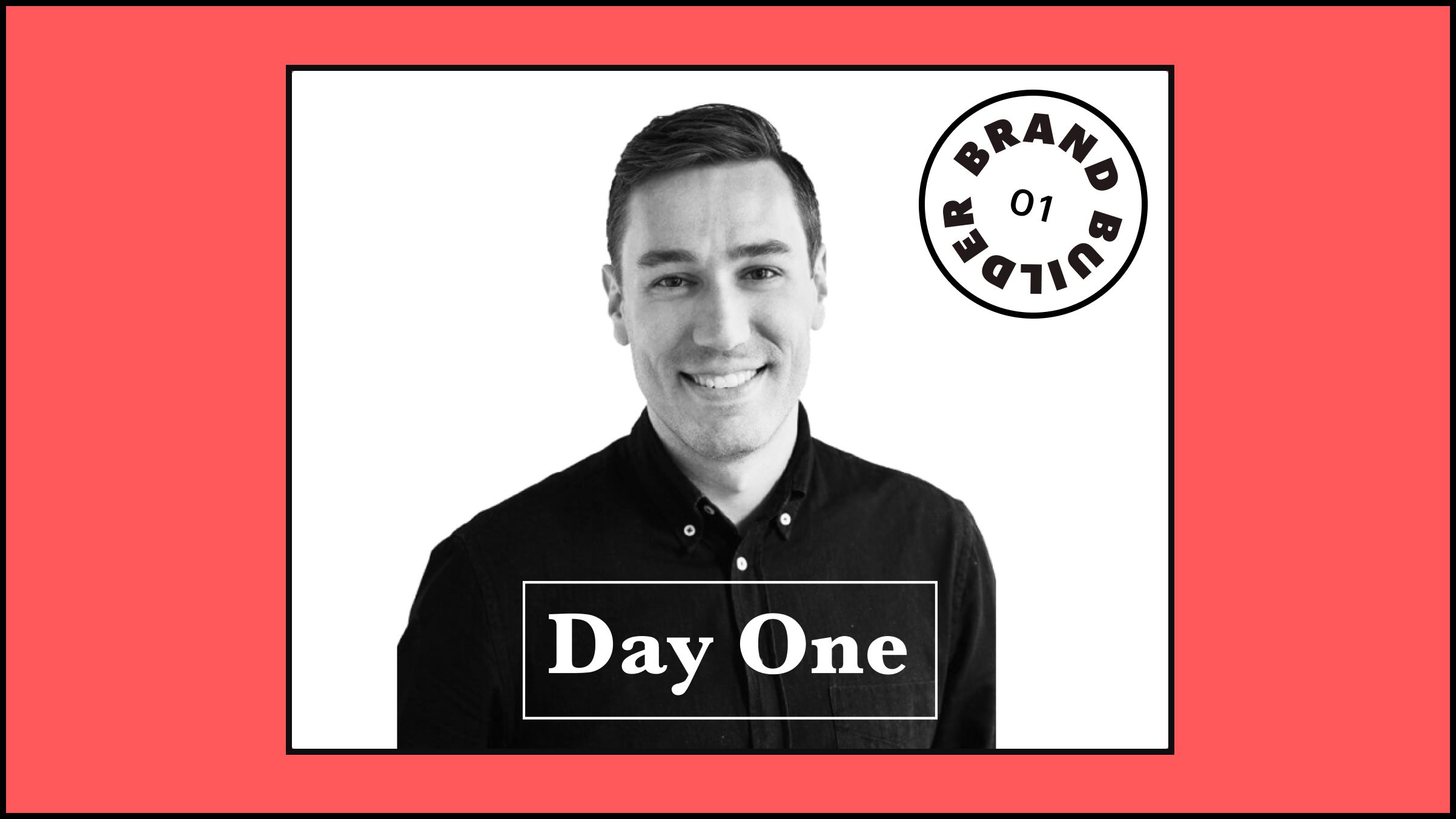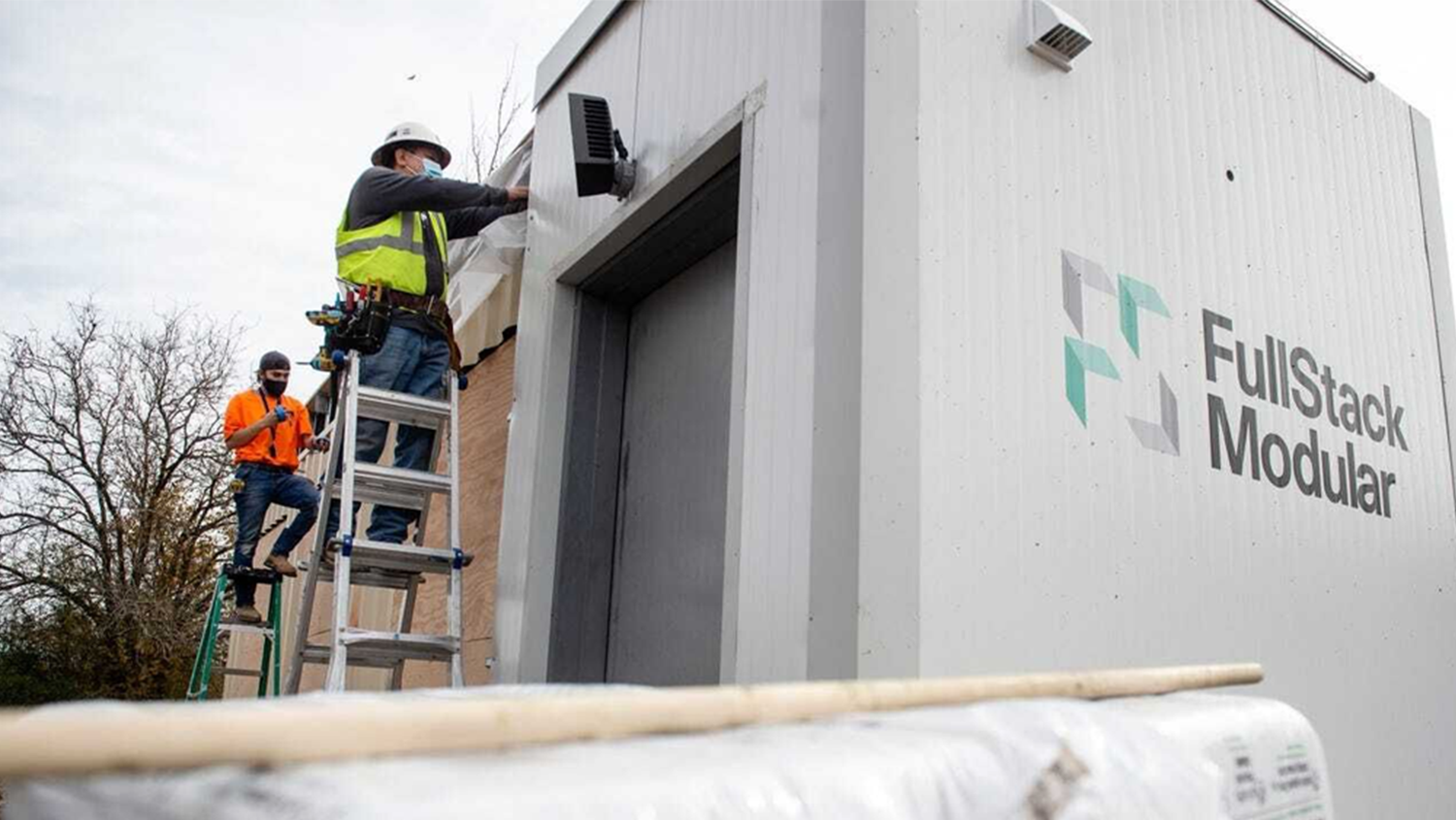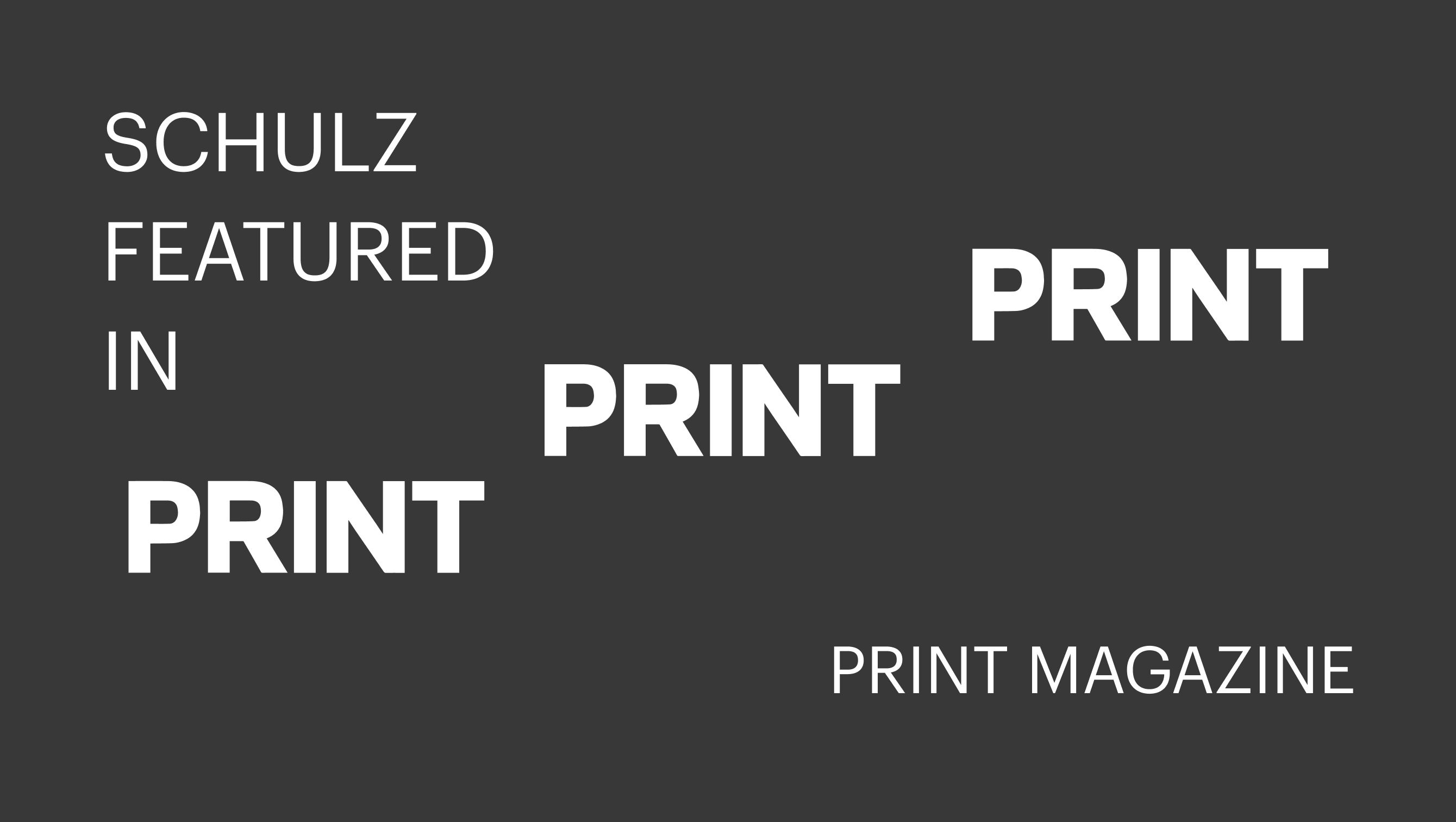
Brand Builders: Andrew Hutton, Founder of Day One
Market saturation calls for above-and-beyond brand connection and community. We're seeing this now more than ever as new businesses launch every day and compete for the attention—and hearts—of their audiences.
In the first of our new conversation series with founders and industry thinkers, we sat down with Andrew Hutton of Day One. Despite an increasingly crowded online community space, Andrew and his team have built a thriving place for early-stage founders and entrepreneurs to develop collaborative mentorships and give meaningful attention to their ideas.
Before we dive in, mark your calendar for March 31st 5-7pm and stop by the virtual Day One Showcase. In addition to hearing Day One fellows present their businesses, this free event will also feature accelerators, venture studios, and other early-stage partners (Together will have a virtual "booth" — so drop in and say hi!).
Hi Andrew, welcome! Thank you for taking the time to speak with us today. We're stoked to share your story. First off, introduce us to your organization, Day One.
Day One is a community and fellowship of early stage founders. We exist to support and help founders get through the difficult early stages of building a business. We do that by bringing founders together and forming them into tight-knit communities, providing expert mentors to guide and give advice through those early challenges, and sharing our own advice and expertise.
We make it efficient and fun and effective for a founder to find the support that they need — instead of having to bash their head against the wall of venture funding, or spend a ton of money on coaching services. We're a third wave of how to support early-stage founders when they're just starting out — hence, Day One.
What was the impetus for starting Day One? What led you to this?
Before founding Day One, I worked at a startup venture studio called Human Ventures for three years. We had a really great run. We built about a dozen businesses in my time there, and, along the way, built a great machine to build those businesses — process and structure and a network around us. I personally got to wear many hats and work with so many different founders. I learned what it was like to build a business from nothing to something.
I took a step back at the beginning of 2020, and asked myself, "How can these types of resources, people like me, and these networks help more people and more founders?" Many founders think venture capital the only game, but that serves only a very small segment of the entrepreneurial pie. And I wanted to help make support available to entrepreneurs in other ways.
As COVID was happening and the world was going remote, it started to coalesce that I could take my background and skillset and superpower, and build a system that would allow us to reach more people. Day One in a lot of ways is an extension of my personal passion to reach more founders and do it in a way that changes the game for them.
You were building Day One during COVID-19. How would you say the pandemic has impacted startup culture or business-building in general?
In tons of ways. Some good, some bad. I'd say one positive that I think a lot of folks have leaned into — the main silver lining — is that the breaking down of tight geographic networks has allowed for folks to move around and have just as much access. The reality of talent being everywhere, opportunity not, changed overnight, and there was definitely a new kind of energy behind the ability to find great people wherever.
When we started Day One, we were already leaning into that energy. We began to form before the pandemic — and we always wanted it to be virtual. The geographic focus of almost every accelerator, incubator, or even VC firms felt like another form of exclusion.
On the other side of it, for founders, it is certainly harder to have those interesting, innovative thoughts and build a new business, when you're completely remote. I think later stage teams can do remote when it's more executional. But early stage is definitely tough. It's hard to have that hyper energy, like you're in a small little wartime office together sort of thing. And I think founders need that at times — that impetus and energy.
You talk quite a bit about entrepreneurship being the most important skill of the 21st century and a large driver of personal growth. Can you speak more to how this has shaped your individual trajectory and what it means to you personally?
Entrepreneurship is the most important skill, because, first and foremost, it's about learning and getting out of your comfort zone and doing something new. That amount of renewal, regeneration, and the ability to continually grow and learn — I think that is the most important skill as we move into the 21st century.
When I was at Human Ventures, I was very close to entrepreneurship, but I was never the entrepreneur. It's interesting to juxtapose those lessons against what I'm feeling and learning now as an entrepreneur itself. If you're not in the game, you don't really realize what it is — because I was as close as you could get to the game, and it feels distinctly different.
If you're looking to grow, entrepreneurship is the real life MBA in terms of how business works and how people work. And I wanted that. Being so close to entrepreneurship and not in it, I had always felt that I was missing that experience. Now I'm living it and I don't regret it.
As you help early-stage founders find their footing, is there a common piece of advice that you find yourself returning to?
First, it's going to take longer than you think, so don't set yourself up to burn out in three months. Set yourself up for a sustainable way of building. And if you can be there, then you're indestructible — because you can just keep working on your thing, and learning and evolving and growing until it works, because no one can take it away from you. I would rather all entrepreneurs find themselves there — without like ticking time bombs of time or money or energy taking them to zero.
Secondly, you probably don't have a high enough bar for how good your idea needs to be. I would say the vast reason most businesses fail is because the idea at the beginning just wasn't good enough. Discerning that is the superpower: to say no to the 90% of ideas that aren't going to quite cut it so that you can focus on the ideas that are good.
There's a caveat to that, however — an idea that's bad today might not be bad tomorrow or might not be bad for somebody else. It's just highly case-dependent. That discernment is maybe why a good investor becomes a good investor — because they can discern that from the very beginning but it definitely isn't easy. You have to see a lot of ideas or live through a few of them to know what good looks like and what bad looks like.
Day One is founded on this idea of collaborative mentorship. What makes this approach so effective?
Collaborative mentorship is the idea that it can't be surface-level platitudes — that won't be effective for a founder. The value of one-to-one coaching is really underestimated. I've always kind of railed against the Twittersphere, just throwing out content. I mean, I know we're literally doing that right now — but content in the entrepreneurial world doesn't get the job done. It's all about close-in, hands-on mentorship that is really effective for a founder, especially when there's relationship and context. You have to go deeper.
The other idea is diversity — meaning diversity and quantity, frankly, of opinions and perspectives and people. There's something to be said about having more people around you, especially if they come from different backgrounds. Diversity means every kind of diversity — lived experience, functional diversity, as well as diversity of ethnicities, mindsets, and opinions.
What do you consider to be the foundation to great collaboration?
I'm a big believer that everyone has something to offer. Nobody is just a taker here — they can always give an opinion, or be a user, or connect somebody to somebody that they know. Everyone has something of value to add, and engendering this "pay it forward" culture means everyone's boats are getting lifted — the whole thing is valuable.
Taking the cognitive load off of founders helps them execute. The more we can aggregate in terms of aggregated experience — like where to go next, when this thing happens — it's a huge value-add. We have all those kinds of playbooks, deals, perks, and all those things together to help make that easier for founders.
What is it like to spend so much time and energy shepherding other creators' and founders' projects?
It is very meta — although if I'm honest, when I'm in it, it just feels like the job. It's the weird catch 22 where it's easy to give advice without necessarily taking it. There's a bit of compartmentalization that happens. When I'm in it, it's the fun stuff — I love doing the workshops, and giving lessons, and hearing from our mentors and speakers, and being a coach myself. Outside of it is where all the stress is — are we improving? Are we getting ready for the next cohort? It's only in interviews like this when I get really philosophical about it.
It has made me so much more empathetic. That's the number one thing that's happened over time. As I've stepped back and had conversations with mentors myself, I know how that infuses into the coaching that I would give a founder or how I would guide them.
Here at Together, we often work with startups and new entrepreneurs. What role do you see brand and design playing into the evolution of these ideas and projects?
Brands need a voice. They need an opinion. I brought on an interim creative director and head of marketing — and maybe this is my best managerial decision because I just let him go with it. He started to add things to the brand. My best decision was to just step back.
Something we've struggled with is the non-visual side of the brand. What's the simple version of what we stand for? It's hard because it's multi-faceted, and I may be too close to it. I have a very strong appreciation for how multi-faceted and difficult entrepreneurship is — and I try to not dumb it down. Day One isn't an "easy button." It's the real deal. So how do we simplify that? I don't know if we've nailed that yet. We're learning how to figure out how to get ourselves down to our core.
Again, "Do as I say, not as I do." That's where I push folks in the fellowship — if you really understand your customer and the value you're delivering to them, theoretically, those position statements should be easy. And maybe that's a sign that we have to be a lot tighter with what we do. And we have some things in the works on that.
To be candid, that's our next challenge: How do we turn the corner with our marketing and our brand expansion and development? If you have a great brand and no one knows it, is that a great brand? In practice, I think, is where it all matters.
What are some entrepreneurship trends you're seeing in 2021?
The piece that's most interesting is the fact that we're going to have entrepreneurs who are properly micro-, passion-economy entrepreneurs. We used to call them influencers but now you have all these different ways for people who wouldn't be Instagram-famous that can make a living. That will create a massive explosion of entrepreneurship — the bottom of the entrepreneurial pyramid is going to get huge and accelerate the gig economy.
I think we're playing in this new spot where you have all these new players — and tools for those people to market, to do their taxes, is going to be huge. All those same ideas and questions were thrown about with the gig economy: "Who's gonna help them do their taxes? Where are they going to hang out and get health insurance?" It's not a great sign of our society than once the white-collar workers start doing it, people start to pay attention.
Day One's mission is to help more people become entrepreneurs. There will be plenty of people who are going to need to go deep — like folks who transition from micro-entrepreneurship to building a bigger business. I'm super pumped for that whole trend.
I call it permission-less entrepreneurship. You don't have to be raising venture capital to be able to build. You just start. And eventually, you might get big. And I think that's the coolest thing that I've seen. I do hope we see different types of venture funding happen — meaning that it's not all "to the moon or bust" in terms of scale. I hope there's more types of funding for small creators to stay small and make a living.
How do you protect your time?
Poorly. I usually let a day start to become my meeting day, or just stack them at the ends of the day. I'll do whatever I can to try to find some chunks.
Otherwise, I just let my body tell me when I'm done. If I'm ready to work late, I might do it, but I'm also very okay to just watch TV and not feel guilty about it. Even for a startup founder, I just do what feels right. I'd say it isn't so much protecting my time as it is just going with the flow. I basically just make sure things get done at the end of the day — but then be as casual about it as possible.
What are three must-haves for founders?
One: Be in a sustainable spot. Don't be slowly slipping away, one way or another. If you're burning money, that's kind of what happens — but get out of that as fast as possible. Be default alive. Number one thing if you can do it.
Two: Be as fearless as you can. But be true to yourself. I feel like this whole building in public thing is important and useful — but it's also tiring and a trap for some people. Like some people are never going to be prolific tweeters and it's a trap to try. Know yourself as well as get out there and take advantage of what's out there.
Third, I'll steal something one of our mentors said — but have some fun. If you're not controlling the thing that's happening, if you don't have agency in this, why are you doing it? If you get to the point where you feel trapped by your startup, it's not a good spot. You're doing this to take control and ownership of something. And you are your own boss. So go back to being it. Be your own boss and remind yourself of that.
Learn more about Day One here and hang with us at the virtual Day One Showcase to meet Andrew and other Day One fellows.

